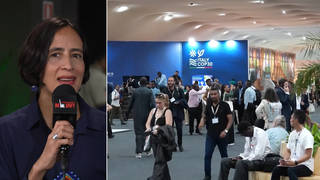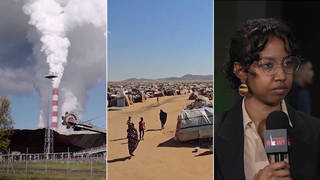
Guests
- Ljiljana Smajloviceditor-in-chief of the Serbian newspaper Politika
In Serbia, some 200,000 demonstrators gathered in Belgrade Thursday to rally against Kosovo’s declaration of independence from Serbia and its support from the West. During the demonstration, around 1,000 protesters attacked the US embassy, smashing their way inside, throwing flares through the window and setting parts of the building on fire. [includes rush transcript]
Transcript
JUAN GONZALEZ: In Serbia, some 200,000 demonstrators gathered in Belgrade Thursday to rally against Kosovo’s declaration of independence from Serbia and its support from the West. During the demonstration around 1,000 protesters attacked the US embassy, smashing their way inside, throwing flares through the window and setting parts of the building on fire. One protester ripped the US flag off its pole, while others waved the Serb flag from the balcony.
At the time, there appeared to be no police protecting the embassy, but riot police eventually arrived, firing tear gas to disperse the crowd. The fires raged for half an hour, and when firemen finally managed to get inside the building, they found a charred body, which has not been identified but is thought to be one of the protesters. Hospital officials said around 150 people were injured in the clashes.
The attack on the embassy drew swift condemnation from Washington and the UN Security Council. White House spokesperson Dana Perino described those responsible as “thugs.” Meanwhile, Serbia Foreign Minister Vuk Jeremic told Reuters — called it “absolutely unacceptable, absolutely regrettable.”
AMY GOODMAN: Serbia, supported by Russia and China, says Kosovo’s independence declaration on Sunday violates international law. Serbia has since recalled its ambassador to the United States.
We go now first to Belgrade to speak with Ljiljana Smajlovic. She is the editor-in-chief of the Serbian newspaper Politika. We’re also joined in our firehouse studio by Jeremy Scahill, independent journalist, Democracy Now! correspondent. He covered the NATO bombings of Kosovo and Yugoslavia for Democracy Now! in 1999, has just been awarded another George Polk Award for his book called Blackwater. Samantha Power also joins us. In a few minutes, we’ll be discussing her latest book, Chasing the Flame, but she’s written extensively about Bosnia and Kosovo in her book A Problem from Hell: America and the Age of Genocide, which won a 2003 Pulitzer Prize.
Ljiljana Smajlovic, why don’t you begin? Tell us what happened, what is happening now in Belgrade.
LJILJANA SMAJLOVIC: Well, everything is quiet this morning. The city’s services are clearing out the debris, replacing shop windows. All the buildings are secure. No one expects anything like last night to happen again. But last month, some thousand people were, in some sense, allowed by the police to take over part of the US embassy and set it on fire, and there is a dead demonstrator whose identity has not yet been found, because there’s nothing to identify him by. The body is charred.
JUAN GONZALEZ: And the government’s reaction to the criticism it’s received for failing to properly provide security for the embassy?
LJILJANA SMAJLOVIC: Well, the government seems to be sincerely apologetic. At least that’s the line the foreign minister has taken. And I do think there were some serious shortcomings about the way this building was secured, because on Sunday already, when the Kosovo Albanians declared independence, this building, the US embassy building in one of the main streets in Belgrade, was attacked. So people had to expect that the demonstrators would have another go at it. And it’s difficult to understand why there was no more security for that building.
AMY GOODMAN: Can you explain the main demands of the people who were protesting yesterday outside the US embassy?
LJILJANA SMAJLOVIC: Well, in fact, there were no demands. I’m afraid that the US government is right to call them a mob or thugs, because they had no demands. This rally was really a peaceful rally, which ended, by the way, at the largest church in Belgrade, the St. Sava Church. So there was a major — a big vigil. This was like a prayer for — and, by the way, the local estimates say there were almost half-a-million people that gathered, around half-a-million. So this was a prayer with half-a-million people participating in it, but at the time of the prayer, some hundreds of people, or up to 1,000, went against the building. They had no demands.
And afterwards, to seal that impression, they went on to the main street and looted buildings and robbed the Levi’s store and the Nike store and stole everything that was in the shop windows and then also stole everything that was inside. So I would say that there were some professional organizations there by probably just ordinary criminals and gangs and that this was not — that side of the rally was not a political protest at all.
JUAN GONZALEZ: And, obviously, about half-a-million people don’t just appear on the streets. There had to be organizations that called the protest. Who were the main sponsors of the protest itself?
LJILJANA SMAJLOVIC: It was the government of Serbia, but I have to point out that on Sunday, when some spontaneous protests erupted, the government seemed pretty unhappy about those protests, and the government issued a strong warning to people to wait and be patient, and the government said that they would call on a large rally of solidarity with the Serbian people in Kosovo, and they even delayed that rally until Thursday afternoon. And I think it was clear from the rhetoric that the government was hoping that by Thursday, the passions would have cooled down a bit and that there would be a possibility to hold a large rally, where speeches, by the way — and I went to listen to the speeches — were not inflammatory speeches. There was no intention to inflame the crowd. And then they led them to this prayer for the Serbian people in Kosovo. So I don’t think that the government really should be blamed for organizing the rally because groups of hooligans attacked the city.












Media Options